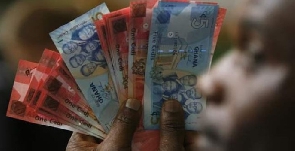A report by Databank Research has predicted that the central bank is likely to hold the policy rate again, as a cut will make the market unattractive to foreign investors holding cedi bonds; and it anticipates a high-interest rate environment in the year due to government borrowing to finance its budget ahead of the December polls.
Policy rate currently stands at 16 per cent after a 100 basis points cut in January 2019, a move that was unpopular with foreign investors who hold bonds in local currency as some of them had to convert their investments into foreign currency to keep the value – resulting in fast-depreciation of the cedi in first-quarter last year.
This reason, together with the looming fiscal risks ahead of the 2020 election, is what Senior Economist of Databank Research team, Courage Martey, says may inform the BoG Monetary Policy Committee’s decision to maintain the policy rate where it is.
“In the report we cited, the prevailing fiscal risk remains high in 2020 – especially being an election year; and during that period, government’s borrowing requirement is going to be quite high to fund its budget for the year. And that will mean there is likely to be moderate pressure on interest rates. If there is that pressure on interest rates, especially within the short-term, it will not be prudent for the policy rate to go down because it will be moving in the opposite direction with pressure on Treasury bill rates.
“And if interest rates go down and fall below the market range, it will undermine the policy rate’s credibility as a monetary policy instrument. So, the high fiscal risk and associated high borrowing requirement make it difficult for an immediate cut in the policy rate,” he said in an interview with the B&FT.
“Now, that notwithstanding, if you look at the currency market, what we have also observed is that the cedi has had a better start in the year than expected; and that is largely coming on the back of the central bank’s consistent intervention – both on the spot market and the forward market of supplying dollars. But you cannot continue supplying the dollars, because your reserves are limited.
“So, you will need a policy rate regime that makes holding cedi securities attractive because the return on them is attractive. If you reduce the policy rate, what you are saying is the return on cedi securities should also reduce; and that will make holding cedi securities unattractive, which will stoke currency pressure. So it is within these contexts that we think the policy rate will be maintained,” he said.
Even though several institutions besides the Databank Research – such as the IMF, EIU, among others – are backing the central bank to maintain the policy rate, that decision will come as another blow to the private sector which is looking forward to lower lending rates from banks.
Because the policy rate has a very significant influence on the determination of lending rates, it will also be impossible for banks to lend to the private sector at cheaper rates if the policy rate remains as it is – essentially meaning there’s no hope for the private sector with regard to affordable loans.
Click to view details



Business News of Sunday, 2 February 2020
Source: thebftonline.com

















